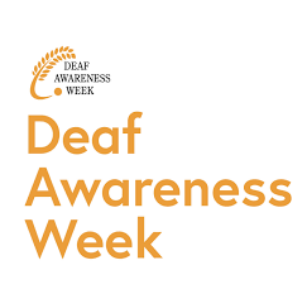
This year’s Deaf Awareness Week runs from 6th – 12th May. The aim of Deaf Awareness Week is to promote greater awareness and understanding of the challenges faced by the Deaf community, to break down the communication barriers that prevent Deaf people from fully participating in society.
Did you know, there are about 12 million people in the UK who are Deaf or hard of hearing – that’s one in six people.
What is the Mental Health and Deafness Service?
Did you know that Deaf people are around twice as likely to experience mental health issues compared to the general population? These difficulties are often made worse by the difficulty Deaf people can face when communicating with their healthcare providers.
The Mental Health and Deafness Service (MHDS), based at Walkergate Park in Newcastle, works with Deaf and Deafblind adults who have mental health problems and/or learning disabilities. The service is run by Cumbria, Northumberland, Tyne and Wear NHS Foundation Trust (CNTW) in partnership with Tees, Esk and Wear Valleys NHS Foundation Trust (TEWV).
The service provides specialist mental health assessment, care planning and treatment.
We work in partnership with local community mental health teams, learning disability teams and inpatient services to offer assessment, treatment, and advice. We work hard to make sure that teams are communicating with Deaf people in the way that is best for each person, and ensure that they areable to work with them in a meaningful and effective way.
A key part of our work is ensuring that Deaf people are communicated with in the most appropriate way for them. Having information in an accessible way means people can trust the process and that the professionals involved understand their difficulties.
This can include supporting people to have British Sign Language (BSL) interpreters for appointments, advising teams about using written information including text messages, and adapting letters and resources to ensure these are accessible to the person.
The importance of trust, and how we build it
The theme of Deaf Awareness Week this year is ‘Love and Trust’.
It can be hard for Deaf service users to trust healthcare professionals. Lots of Deaf people have had negative experiences of healthcare where they have been let down, not understood or not able to communicate their thoughts, feelings and wishes.
When the Mental Health and Deafness Service team are working with a Deaf service user, we understand this and talk about this. We explain that we want to do things differently. We will take extra time to make sure that they understand their choices, are understood, and can make their own decisions.
We work in collaboration with all colleagues to ensure equal access to healthcare. This means we can support our colleagues to understand the experience of being Deaf, explaining how this can affect the person’s trust in the healthcare system and the barriers they experience when engaging with professionals.
This year we have been lucky enough to have a Specialist Speech and Language Therapist (SALT) with our team, who has worked with us to understand some of the challenges Deaf people face when trying to communicate their thoughts and feelings. She has helped us understand some more ways to improve our communication with Deaf people. Access to sign language is so important – but communication is very complex. We have to think about lots of different factors to support Deaf people to understand their care and treatment and communicate their needs.
Our top tips for supporting someone who is Deaf:
- Book a double appointment to allow time for interpretation. Professional, qualified and registered interpreters should be arranged for appointments, using the Deaf person’s preferred interpreter. The interpreter should also have experience in working in mental health settings Interpreter bookings in CNTW can be made online at www.dalanguages.co.uk
- Speak to the Deaf person, not the interpreter.
- When sending appointment letters, provide the option to use text messaging and email to contact the team; please do not ask Deaf people to ring a number.
- Make sure you have the person’s attention before you start speaking.
- Places with good lighting and less background noise are best for conversations.
- Use your normal volume, lip movements and facial expressions; you don’t need to exaggerate or raise your voice.
- Check whether the person understands what you are saying, and if they don’t, try another way of communicating it – never say ‘don’t worry about it’ and move on.
- Let them know about CNTW’s wide range of information and resources available in British Sign Language, including our award-winning self-help guides. There is also a handy wallet-sized card with details on; copies can be requested from the Patient Information Centre or Mental Health and Deafness Service.)
If you live in the Northeast of England and are Deaf or deaf/blind and think you may have a mental health condition, please speak to your GP who will be able to make a referral to the Northeast Mental Health and Deafness Service for you.
You can also find further information on the TEWV website for County Durham and Teesside and on the CNTW website for the rest of the Northeast.
If you need urgent help with your mental health right now, each of our Crisis Teams has a text number for people who are Deaf or have communication difficulties. These teams can be contacted 24/7:
- North Cumbria: 07795 656 226
- Newcastle and Gateshead: 07919 228 548
- North Tyneside and Northumberland: 07887 625 277
- South Tyneside and Sunderland: 07889 036 280
You can also contact NHS 111 using SignVideo or the 18001 111 Relay UK app.
